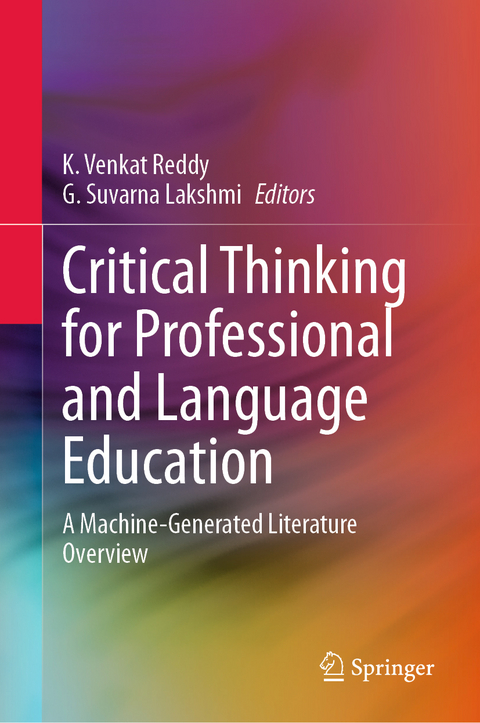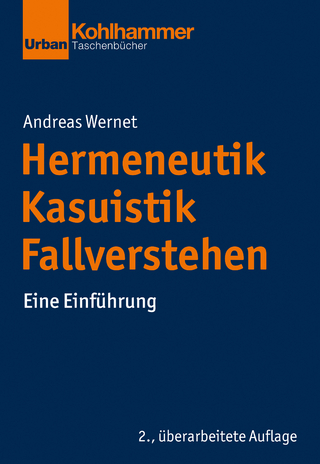
Critical Thinking for Professional and Language Education
Springer International Publishing (Verlag)
978-3-031-37950-5 (ISBN)
This book is the result of a collaboration between a human editor and an artificial intelligence algorithm to create a machine-generated literature overview of research articles analyzing importance of critical thinking in Educational Settings. It's a new publication format in which state-of-the-art computer algorithms are applied to select the most relevant articles published in Springer Nature journals and create machine-generated literature reviews by arranging the selected articles in a topical order and creating short summaries of these articles.
This book is a comprehensive guide to critical thinking research in education. It explores different definitions of critical thinking and its importance in specialized fields like business, engineering, and science. Presenting research on assessment, this resource delves into the integration of ICT tools for teaching critical thinking.
With practical tools, strategies and tasks to develop critical thinking skills, thisbook is intended for researchers, educators, and those seeking to improve their critical thinking abilities.
lt;p>Dr. K. Venkat Reddy is a professor with almost three decades of experience in teaching English (ELT). His research focuses on critical discourse analysis and critical pedagogy.
Dr. G. Suvarna Lakshmi is a Professor in the Department of ELT with over two decades of teaching experience. Her specialty is critical thinking in language pedagogy.
Preface.- 1. Introduction to Critical Thinking Skills.- Publications: A Meta-Level Approach to the Problem of Defining 'Critical Thinking'.- Critical thinking for 21st-century education: A cyber-tooth curriculum?.- Critical Inquiry: Considering the Context.- An exploratory study on the application of conceptual knowledge and critical thinking to technological issues.- Principles for learning and competences in the 21st-century curriculum.- Critical Thinking Across the Curriculum: A Vision.- 2. Teach Critical Thinking.- Publications: Strengthening critical thinking in engineering students.- How to teach critical thinking: an experimental study with three different approaches.- Communication, Critical Thinking, Problem Solving: A Suggested Course for All High School Students in the 21st Century.- Classroom environments that foster a disposition for critical thinking.- Teaching critical thinking skills in a Hong Kong secondary school.- Explicitly Teaching Critical Thinking Skills in a History Course.- Clear skies ahead: optimizing the learning environment for critical thinking from a qualitative analysis of interviews with expert teachers.- Impact of social problem-solving training on critical thinking and decision making of nursing students.- Teaching Critical Thinking in Undergraduate Science Courses.- Teachers' Learning Communities for Developing High Order Thinking Skills-A Case Study of a School Pedagogical Change.- Teacher professional development through digital content evaluation.- Investigating University EFL Teachers' Perceptions of Critical Thinking and Its Teaching: Voices from China.- 3. Teaching Language through critical thinking strategies.- Publications: Strategies for effective faculty involvement in online activities aimed at promoting critical thinking and deep learning.- Metacognitive strategies that enhance critical thinking.- Inquiry-based science teaching in community secondary schools in Tanzania: role played by thelanguage of instruction.- Enhancing Critical Thinking Skills through Decision-Based Learning.- The language deficit: a comparison of the critical thinking skills of Asian students in first and second language contexts.- Integrating direct and inquiry-based instruction in the teaching of critical thinking: an intervention study.- Mapping the Relationship Between Critical Thinking and Design Thinking.- Effects of using inquiry-based learning on EFL students' critical thinking skills.- Constructing critical thinking in health professional education.- Exploring the Gender Perspective in English Language Teaching (ELT): Voices from ELT Practitioners in Philippine Higher Education Institutions.- 4. Tasks to Develop Critical Thinking.- Publications: Advancing Critical Thinking Through Learning Issues in Problem-Based Learning.- Acquiring Critical Thinking and Decision-Making Skills: An Evaluation of a Serious Game Used by Undergraduate Dental Students in Dental Public Health.- Characterizing Students' 4C Skills Development During Problem-based Digital Making.- Computer-aided argument mapping in an EFL setting: does technology precede traditional paper and pencil approach in developing critical thinking?.- On the Plausibility of Bloom's Higher Order Thinking Strategies on Learner Autonomy: The Paradigm Shift.- Purposely Teaching for the Promotion of Higher-order Thinking Skills: A Case of Critical Thinking.- Examining the Effects of Immersive Game-Based Learning on Student Engagement and the Development of Collaboration, Communication, Creativity and Critical Thinking.- 5. Practicing and Assessing Critical thinking.- Publications: Mind the gap: Cognitive active learning in virtual learning environment perception of instructors and students.- An examination of Vygotsky's socio-cultural theory in second language acquisition: the role of higher order thinking enhancing techniques and the EFL learners' use of private speech in the construction of reasoning.- Cognitive contours: recent work on cross-cultural psychology and its relevance for education.- Assessment of Critical Thinking in a First-Year Dental Curriculum.- 6. ICT for Thinking and Learning.- Publications: Strategies for fostering critical thinking dispositions in the technology classroom.- Digital storytelling: a meaningful technology-integrated approach for engaged student learning.- The effectiveness of digital storytelling in the classrooms: a comprehensive study.- Online communication and interaction in distance higher education: A framework study of good practice.- Transforming learning for the smart learning environment: lessons learned from the Intel education initiatives.- Spaces for interactive engagement or technology for differential academic participation? Google Groups for collaborative learning at a South African University.
| Erscheinungsdatum | 24.10.2023 |
|---|---|
| Zusatzinfo | VII, 168 p. |
| Verlagsort | Cham |
| Sprache | englisch |
| Maße | 155 x 235 mm |
| Themenwelt | Sozialwissenschaften ► Pädagogik ► Allgemeines / Lexika |
| Sozialwissenschaften ► Pädagogik ► Berufspädagogik | |
| Schlagworte | application of conceptual knowledge • critical thinking • Deep learning • Problem Solving • professional education |
| ISBN-10 | 3-031-37950-0 / 3031379500 |
| ISBN-13 | 978-3-031-37950-5 / 9783031379505 |
| Zustand | Neuware |
| Informationen gemäß Produktsicherheitsverordnung (GPSR) | |
| Haben Sie eine Frage zum Produkt? |
aus dem Bereich


